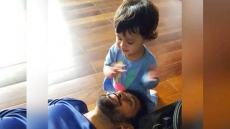WASHINGTON — A next-generation artificial hand is letting two amputees tell the difference between a soft or firm touch — like holding a child without squeezing too tightly. It's another step toward developing prosthetics that can feel.
Implanted electrodes allowed the men to feel the same intensity of pressure in the artificial hand as they could in their other hand, scientists at Case Western Reserve University reported Wednesday.
To Keith Vonderhuevel, testing the experimental device meant finally cradling his 2-year-old granddaughter without first taking off his artificial hand for fear of hurting her.
"Just to be able to touch and feel, it's an amazing thing," said Vonderhuevel, of Sidney, Ohio, who lost his right arm below the elbow 11 years ago in a job accident. "It feels like a light pressure. The harder I squeeze, the stronger that pressure gets."
And while enhancing prosthetics with a sense of touch will take lots more research, the Case Western team is beginning the next big step: Vonderhuevel and a second volunteer can use the experimental hand at home, not just the laboratory, to start learning if it makes a difference in everyday life.
Vonderhuevel cooks with it in place of his usual prosthetic, more comfortable that he won't crush an egg or the bread he's buttering.
Getting to the point where users respond as they would to a normal limb is key "to moving toward truly creating a replacement for the hand," said Case Western biomedical engineer Dustin Tyler, who leads the project.
Normally when people reach for something, the hand automatically grasps with just enough force to hang on. Nerves in the skin fire rapid messages to the brain so the muscles immediately squeeze tighter or loosen up.
But users of prosthetic hands don't have that intuitive control. Instead they have to judge every motion by eye so they don't crush or drop something, difficult even with practice. That's why many hesitate over shaking hands or holding something delicate.
Lots of work is under way to add a sense of touch. Earlier this month, researchers at the University of Pittsburgh reported harnessing brain waves to help a paralyzed man not only move a robotic arm with his thoughts but, in a first, to feel pressure in his own motionless fingers when the artificial ones were touched. Electrodes implanted in the part of his brain that controls hand sensation made it happen.
For amputees, key nerves that once controlled the hand still remain in the stump of the missing limb. Two years ago, Case Western researchers wired those nerves to a prosthetic outfitted with sensors that let Vonderhuevel and fellow volunteer Igor Spetic of Madison, Ohio, sense different textures. When the prosthetic sensors were touched, they activated a portable stimulator that sent electrical signals to the nerves, which detected textures like a cotton ball or sandpaper.
Wednesday's study, published in Science Translational Medicine, went further: How to stimulate the intensity of touch?
Scientists didn't know exactly how nerves fire in response to pressure, necessary for recreating the sensation with electrodes. But in a series of experiments, the team from Case Western and the University of Chicago learned how the number and frequency of nerve fiber stimulations adjust with different amounts of pressure.
"Our stimulation is as sensitive as your real hand," Tyler said. He's been gratified to feel Vonderhuevel change from "the wet-fish handshake to the solid I'm-interacting-with-you handshake. There is so much information in the subtleties of touch."
Learning how stimulation can produce more realistic sensations is a key step, said University of Pittsburgh rehabilitation specialist Robert Gaunt, who wasn't involved in Wednesday's work but is part of a team developing similar technology for the paralyzed.
But he's especially intrigued by how the touch-enabled hand will fare in at-home use.
"This is an absolutely crucial step for making systems that really work," Gaunt said, noting there are scenarios a lab can never replicate. "Home use will provide an opportunity to really see the benefit of sensation."





